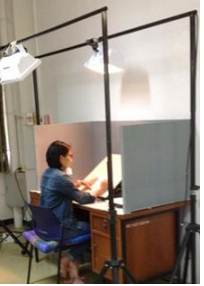Temporary Lighting Laboratories at Two Universities: Comparison of Methodologies for Research Projects in Thailand and USA
Main Article Content
Abstract
Lighting technology is rapidly evolving and therefore, permanent university lighting research laboratory installations are becoming more scarce. Even when available, permanent university lighting laboratories may become obsolete within a short time period. Worldwide, some researchers have developed temporary laboratory setups which allow them to meet their project needs without the longterm university infrastructure commitments, updates, and maintenance considerations of permanent lighting labs. The purpose of this presentation is to compare the methodologies utilized in two recently completed lighting studies at universities located in Thailand and the United States of America (USA), 13,801 kilometers (8,576 miles) apart. A comparison of laboratory setups, equipment and supplies, financial investments, and study participants are presented. Photographic documentation of the lighting
setups, equipment lists, and associated costs are included. Although the researchers did not previously have any contact before or during the respective study periods, their strategies to develop temporary lighting setups had a few main similarities: overall costs, the use of human subjects, participant sampling methods, the reliance on electrical extension cords and the location of their studies in education spaces at their respective Universities. The purpose of each lighting study differed. Procedures, lighting equipment, supplies and furniture, study period, project costs and human subjects’ involvement times and incentives differed.
Article Details

This work is licensed under a Creative Commons Attribution-NonCommercial-NoDerivatives 4.0 International License.
References
Arango, F., Chang, C., Esche, S. K., & Chassapis, C. (2007). A scenario for collaborative learning in virtual engineering laboratories. Paper presented at the 2007 37th annual frontiers in education conference-global engineering: knowledge without borders, opportunities without passports.
Barker, M., Olabarriaga, S. D., Wilkins-Diehr, N., Gesing, S., Katz, D. S., Shahand, S., Scott, H., Tristan, G., Keith, J., Corrie, B. (2019). The global impact of science gateways, virtual research environments and virtual laboratories. Future Generation Computer Systems, 95, 240-248.
Chandrasekera, T., & Yoon, S.-Y. (2018). The Effect of Augmented and Virtual Reality Interfaces in the Creative Design Process. International Journal of Virtual and Augmented Reality (IJVAR), 2(1), 1-13.
Deniz, D. Z., Bulancak, A., & Ozcan, G. (2003). A novel approach to remote Laboratories. Paper presented at the 33rd Annual Frontiers in Education, 2003. FIE 2003.
Ertugrul, N. (2000). Towards virtual laboratories: A survey of LabVIEW-based teaching/learning tools and future trends. International Journal of Engineering Education, 16(3), 171-180.
Finholt, T. A., & Olson, G. M. (1997). From laboratories to collaboratories: A new organizational form for scientific collaboration. Psychological Science, 8(1), 28-36.
Finkelstein, N., Perkins, K., Adams, W., Kohl, P., & Podolefsky, N. (2005). Can computer simulations replace real equipment in undergraduate laboratories? Paper presented at the AIP Conference Proceedings.
Finkelstein, N. D., Adams, W. K., Keller, C., Kohl, P. B., Perkins, K. K., Podolefsky, N., Sam, R., LeMaster, R. (2005). When learning about the real world is better done virtually: A study of substituting computer simulations for laboratory equipment. Physical review special topics-physics education research, 1(1), 010103.
Hebert, P., Clare, G., Chung, Y., Slevitch, L., & Leong, J. (2015). Effects of Experimental Conditions on Consumer Perceptions of Ground Beef: An Interdisciplinary Study. Journal of Social Sciences and Humanities, 1, 275-282.
Hebert, P. & Kang, M. (2015). Facilitating Move Management: Examining Existing Equipment at a National Laboratory. Scientific and Academic Publishing, 5(2), 34-39.
Howard, D. J., & Laird, F. N. (2013). The new normal in funding university science. Issues in Science and Technology, 30(1), 71-76.
Hua, J., & Ganz, A. (2003, November). Web enabled remote laboratory (R-Lab) Framework. Paper presented at the IEEE Frontiers in Education Conference, Boulder, Colorado.
Zhang, Z., Zhang, M., Chang, Y., Aziz, E.-S., Esche, S. K., & Chassapis, C. (2018). Collaborative virtual laboratory environments with hardware in the loop. Cyber-Physical Laboratories in Engineering and Science Education, 363-402.


